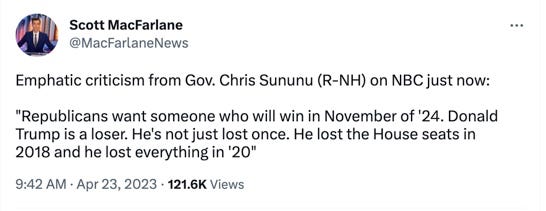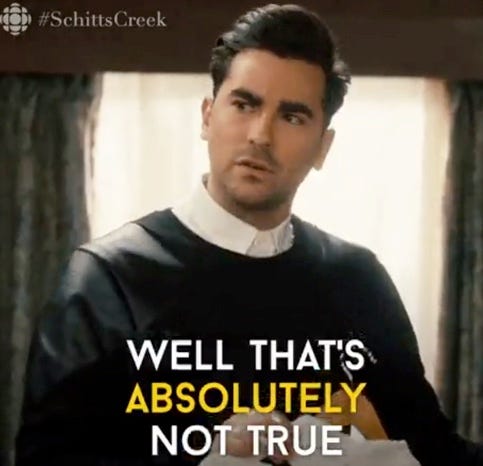The Week Ahead
April 23, 2023
Lots of interesting legal issues surfaced last week, and we’re headed for more in the week ahead. I’ll flag some of them for you tonight, and we’ll discuss in depth as they materialize.
First off, E. Jean Carroll’s lawsuit against Trump kicks off on Tuesday. If you want a refresher, I wrote about the latest on pre-trial motions in this post last week.
The trial is scheduled to last for only a week or two, which suggests Judge Lewis Kaplan is confident he can seat a jury quickly and get to work. We’ll keep an eye on how that goes. It’s not clear that Trump will be in the courtroom unless he testifies. That’s not a great look for a defendant, at least in the eyes of the jury. Since those are the only eyes that count, we’ll see whether he makes a last-minute decision to sit in the courtroom and, if so, whether he can manage anything that resembles decorum. Carroll’s attorneys have said they do not plan to call Trump to testify because they can play excerpts from his deposition for the jury.
This round of trial will involve what’s known as “Carroll 2,” a lawsuit filed after the New York legislature passed a law that gives adult survivors of sexual victimization up to a year to bring a lawsuit that would otherwise be out of time. In this civil action, Carroll sued for battery over the alleged rape and also sued for defamation based on comments Trump made about her after he’d left the presidency. That’s important because Trump defended himself in her first lawsuit, “Carroll 1,” by claiming federal immunity and saying he’d made those comments in the course of his duties as a federal employee.
The Carroll 1 trial has been on hold, after that issue—whether Trump’s conduct was within the scope of his duties—was referred to the D.C. Court of Appeals. If they had concluded they were, that would have been the end of the lawsuit, because when a federal employee is acting within the scope of official duties, the United States steps into their shoes and replaces them as the defendant. But the U.S. is immune from being sued for defamation. So if Trump was acting within the scope of his duties, the case would have been dismissed. (If you think this is confusing, it is. The rule is meant to protect federal employees from being sued for their official acts.)
The D.C. Court ruled on April 13—or rather, they didn’t rule. They said the question of whether Trump was acting within the scope of his employment was a fact question for a jury to determine. That means the case should be set for a future trial date. And the court made comments that undoubtedly made Trump’s legal team unhappy, since they hint at how the judge will instruct the jury on the law when Carroll 1 goes to trial. “Elected officials speaking to the press” are not always acting “within the scope of that official’s employment,” the court wrote. It said that “the moments surrounding” allegedly defamatory statements should be considered to determine whether there were “potentially shifting motivations” and that a professional motivation can be so “insignificant” that it doesn’t qualify as government work. All of that suggests that a jury would be well within its rights to conclude that a president who made caustic comments about a private citizen wasn’t actually doing his job when he made them.
We start with Carroll 2 this week. The allegation that Trump raped Carroll is central to this case. The trial should get interesting fast, but we’ll have to rely on reporting, as there are no cameras in federal courtrooms.
Second, Friday evening, Manhattan District Attorney Alvin Bragg dismissed the lawsuit he filed in Manhattan to try to prevent Jim Jordan from subpoenaing witnesses to testify before House Judiciary Committee meetings. That means the appellate argument scheduled for this week is off the table. The DA issued a statement saying he was “pleased with this resolution, which ensures any questioning of our former employee will take place in the presence of our General Counsel on a reasonable, agreed upon timeframe.” The former employee is assistant DA Mark Pomerantz, who notoriously resigned after Bragg declined to proceed with the case Pomerantz put together during the tenure of Bragg’s predecessor, Cy Vance. Pomerantz wrote a book, which he failed to clear past the DA’s office despite a requirement that he do so.
That book is why Pomerantz is in this situation with Jim Jordan.
So why did Bragg relinquish his lawsuit? We don’t know for certain, but Judge Mary Kay Vyskocil in Manhattan, who drew the case, seemed unimpressed by it. She sided with the committee’s arguments ruling that “The subpoena was issued with a ‘valid legislative purpose’ in connection with the ‘broad’ and ‘indispensable’ congressional power to ‘conduct investigations.’ ” She ruled that “Mr. Pomerantz must appear for the congressional deposition. No one is above the law,” with her tone suggesting a lack of sympathy with the DA’s efforts to prevent Congress from interfering with his prosecution.
Now that Jordan has issued a subpoena for Pomerantz’s testimony in Washington, D.C., any dispute that erupts during an interview would be taken to a federal district judge in that court. As a practical matter, expect Pomerantz to decline to answer any questions about the grand jury investigation of the case Bragg has pending against Trump. If he’s unsatisfied with Pomerantz’s answers, Congressman Jordan is free to go to court to try to enforce his subpoena. But so long as Pomerantz is cooperating in good faith, answering questions about his book and others that he can (and expect him to skewer Trump if given the opportunity—he is clearly not a fan), and declining to answer questions about investigation and internal deliberations on a good-faith basis, it’s unlikely a court would force him to violate New York law and reveal grand jury deliberations. And going to court takes time. Now that the shoe is on the other foot, Jordan may find it was easier to refuse to comply with a subpoena than it is to enforce one.
Third, if you ever thought the GOP would show any shame or regret over January 6 and the leader of their party who made that happen, you’ve obviously been long since disabused of that notion. What’s even worse is that Republicans seem to continue to support Trump, or reject him for all the wrong reasons.
Like New Hampshire’s Republican Governor Chris Sununu. This weekend, he suggested on NBC that the party should reject Trump because he’s “a loser.” That’s great as far as it goes, but it confirms that the GOP has become the party of “we must win at all costs.” Forget about denouncing Trump for being an insurrectionist, a fraud, a grifter, an alleged rapist. Sununu, of course, is further ahead than many in the party who continue to support the former president. But it’s a sad commentary on the GOP if the best they can do is to part company with him only because he’s lost elections.
What’s worse is the continued tolerance, and in some cases the embrace, of the ongoing effort to suppress Democratic votes in 2024. Incredibly, the GOP tapped Cleta Mitchell, Trump lawyer and purveyor of the Big Lie in 2020, to speak to a room full of donors last weekend in Nashville, Tennessee. Mitchell worked with Ginni Thomas on the Council for National Policy to organize efforts to keep Trump in the White House after he lost the election. The New York Times reported that it was Mitchell “who enlisted John Eastman, the lawyer who crafted specious legal theories claiming Vice President Mike Pence could keep Mr. Trump in power.” Mitchell was on Trump’s call with Georgia Secretary of State Brad Raffensperger, where Trump begged the Georgia official to find the votes he needed to pull out a victory in that state.
So it’s shocking that Mitchell was called upon to make a presentation at an RNC donor retreat. She seems to have focused on urging the adoption of tougher rules that could make it harder for college students to cast ballots. The Washington Post reported that Mitchell said that conservatives must band together to limit voting on college campuses, same-day voter registration, and automatic mailing of ballots to registered voters.
Mitchell told donors it was important to “combat” voting on college campuses, citing North Carolina and Wisconsin (two states where students turned out, and turned out to vote for Democratic candidates). She also said that “when” Republicans win the state senate in Virginia, they can eliminate 45 days of early voting and same-day voter registration—because, seriously, why should we make it easy for people to vote? Forget about the working moms, the people who don’t get paid if they’re not at work, the people who struggle to find transportation. Perish the thought that early voting can shorten the outrageous lines at the polls we’ve seen in some parts of the country. Let’s punish all of them to keep them from voting. As for students, let’s make it more difficult for them to vote too.
But seriously, why should legitimate voters be prevented from voting? What possible rationale could there be? The answer is easy. There isn’t one.
Mitchell and the GOP say, as they always do, that restrictive measures are necessary to prevent election fraud. But there is no evidence that supports that claim. Fraud is not responsible when Republicans lose at the polls, and, after 2020, they know it.
Mitchell resorted to complaining about how difficult it was to find election watchers for 45 days of early voting. Even if that’s true, it’s not a justification for denying people their right to vote. The Republican Party is grasping at straws to justify suppressing the votes of a segment of the electorate that they think leans Democratic. If you’re not paying attention, now is a good time to start. Suppression, not fraud, is the real issue in American elections. You can listen to part of Mitchell’s harangue here for yourself.
Mitchell worked hand in glove with Trump to try to overturn the 2020 presidential election. Yet the Republican National Committee is still delighted to put her on their agendas as though nothing important had happened. It means we’re going to have to work harder in the weeks and months ahead. We know what that looks like—help folks register and stay registered, make sure people can vote and that their votes get counted.
Why not get started with that this week? Consider sharing the story of Cleta Mitchell with those around you and ask those who may not question it themselves why the RNC is still platforming a key figure in pushing the Big Lie, and why it’s okay to deny fully qualified college students the right to vote. There aren’t any good answers. It’s up to us to make sure the questions are asked loudly!
Fourth, in Georgia, a little excitement has developed around the fake electors whose efforts to subvert the 2020 election for Trump have now fallen under the scrutiny of Fulton County district attorney, Fani Willis. Last week, Willis moved to disqualify one of the lawyers involved, Kimberly Debrow. You can read the full motion here.
Debrow originally represented 11 of the fake electors along with counsel. In July 2020, the court “directed” prosecutors to have a conversation with the defense lawyers about immunity for their clients. Willis says they did. Debrow’s co-counsel advised the court that after they were advised of the offer, none of their clients were interested in seeking immunity in exchange for truthful testimony. The problem is, despite her co-counsel’s representation to the court, Willis says Debrow never discussed the immunity offers with the clients.
Last October, Willis filed a motion to prohibit the two attorneys from representing all 11 of the fake electors. It can be, as the court said, “ethically messy” to represent so many clients with different interests. Ultimately, the Court let Debrow continue to represent 10 of them, saying that they were similarly situated and had the same interests. The 11th, whose interests seem to have diverged from the others, would be represented going forward by Debrow’s original co-counsel.
Now we get the interesting news in the DA’s motion that “some” of the fake electors have been interviewed by her investigators. They divulged that one of the electors Debrow represents “committed acts that were violations of Georgia law and they were not party to these additional acts.” Willis has moved to force Debrow to step away from representing anyone involved in the investigation. Willis argues that, ethically, Debrow can’t represent all of them when some might want to testify against another. Debrow denies the allegations and says she can prove her story.
However the motion shakes out, I’m intrigued by the suggestion that some of the fake electors are speaking with the DA’s investigators. This could signal that they are cooperating, and that could explain why Willis hasn’t indicted the case yet. The prospect of having these additional witnesses on this aspect of the case could be highly beneficial for Willis if she has decided to indict charges that would require proof that people outside of Georgia, for instance Trump lawyers or even Trump himself, suggested or directed the fake slate’s activities. So we turn again to Georgia, where a new grand jury panel will be sworn in in early May, providing Willis with optimal timing to move forward. We’ll look for more activity on this motion this week.
Finally, Elon Musk has “given back” blue checks to a number of folks on Twitter, including me. No warning; it just showed up.
Some users have posted that he’s doing this for users with more than a million followers. But none of that shows up on my profile—if you hover over the blue check, it says I’ve subscribed to the new Twitter Blue and that’s just not the case. I haven’t, and I never will. Just wanted you all to know.
We’re in this together,
Joyce





"Strap in this week. It's going to be a bumpy ride."
In addition to our collective national headaches, here in Akron, we've had a week of protests over a police shooting of a man with a broken taillight. Shot 43 times. Complicated set of circumstances. Downtown boarded up and police lobbing tear gas. My nerves are shot, yet we've miles to go before we sleep. I just want to look at pics of Joyce's chickens.
Mitchell is treacherous. We are not giving up on North Carolina students—you can be sure of that.